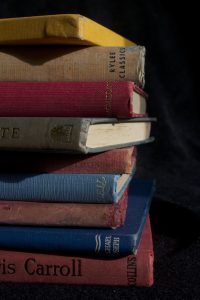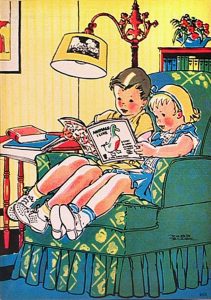Read to Write
Blogger: Cynthia Ruchti
A friend visited last week. She’s a minimalist, which I appreciate but have yet to mimic. The one thing I collect–other than dust–that caught her eye was something that shows up in every room of my house. Yes, including the bathrooms.
Books.
It’s expected books would pile up in my office, but they also occupy space in the downstairs half-bath, aka The Library. They’re stacked on a hallway dresser upstairs and a bookshelf unit wedged between doorways farther down the hall.
Books tumble over themselves from bookshelves in every bedroom, including the guest room, where the bookshelf leaves room for little more than two twin beds and a nightstand full of…yes…books.
It’s been said before. The subject has been addressed on this blog in the past.
Why do agents return to the three-word advice–Read to write–so often?
Reading changes us
In profound ways, what we read changes us.
But the way we read, how often, and how widely changes us, too.
Reading imprints language rhythms on our writer brains.
It informs us, establishing greater confidence in decision-making.
It educates.
Reading inspires.
Writers depend on it.
What does a writer read to become a better writer?
Wise writers read:
New books
Books in their genre
Books outside of their genre
Industry publications
Blogs about writing
Blogs about reading
Author blogs
Blogs about their projects’ subject matter
Special interest blogs related to our target audience
Books for research
Books for fun
Classics
New releases
Pulitzer Prize winners
Tattered copies of old favorites
Poetry books
The Bible (a given)
Other authors’ back cover copy (to see how it’s done)
Other books’ reviews (to see what captures a reader’s attention)
Closed captions on movies (to gain understanding of dialogue pacing)
Their contracts (seriously)
And the occasional royalty statement
A writer caught reading can legitimately say, “I’m working.”
Because every sentence we read informs the sentences we write.
Every word picture we linger over helps expand our skill at creating gripping analogies, metaphors, similes.
Every page we turn develops our capacity for writing page-turning books.
What book have you read lately that made you a better writer? http://ctt.ec/c8dag



 Don’t Put Me to Sleep!
Don’t Put Me to Sleep!
Cynthia, I SO get your house’s ambience! There are stacks of books everywhere here…and since I was reading about 300 books per year before I got sick…well.
* The authors who have influenced and informed my writing life are Nevil Shute, Richard Bach, and Andrew Greeley. Without their example, and without the help of my mentor, the late Marvin Mudrick, I would have written nothing deeper than ad copy and training manuals.
* Nevil Shute is probably the best (and today, most underrated) storyteller of the 20th century. He could bring situations and character to such vivid life, with simple yet deep prose. It’s something of an irony that he’s now best known for “On The Beach” and “A Town Like Alice”. Both are very readable, but neither reaches the heights of “In The Wet” or “Round The Bend”. (Veracity compels me to mention that the latter two works contain elements of the transcendent that have also inspired me; everything I write is God-haunted.)
* Richard Bach is a master of description in his early works (‘Stranger To The Ground’, ‘Biplane’, and ‘Nothing By Chance’), and developed what was to me a winning gift for dialogue in ‘Jonathan Livingston Seagull’ and ‘Illusions’. I read and re-read those books, hoping that one day I could marry the lyric telling of place and space with true-to-life conversational style.
* And Andrew Greeley…he made it OK to write from a Catholic worldview. Most of my life has been spent in places that are overwhelmingly Papist; I understand the culture, and the hard-drinking and militantly celibate priests (toss the tabloid news; most priests are so arrow-straight they can fit through the crack between wall and door without the need for opening the thing).
* There’s a disadvantage here…these dudes go back decades, and their influence makes my voice kind of dated.
* But it’s MY voice, and I figure I can overcome ‘dated’ with ‘LOUD’.
And we love your voice! Compelling. Lifts us higher.
Cynthia, wow…thank you so much. You’ve given wings to my heart, this morning.
Round the Bend– read in Guadalajara on a vacation at 17-affected me as well.
I always have several books going at the same time, including one in progress in the bathroom — right now that’s “Blind Spots: Why Smart People Do Dumb Things” by by Madeleine Van Hecke. Funny thing, I did a dumb thing at work this week, came home and read why. In the bathroom. The perfect place to ponder my blind spots.
This story brought a smile to my face. The perfect place to ponder blind spots.
As a writer, I’ve often heard other writers talk about how they don’t read as often and NEVER while they’re writing a book. If I followed that rule is never read another book again lol. I always read and often it’s 3 books at a time. I am reading Rachel Hauck’s The Writing Desk, Beatriz William’s The Secret Life of Violet Grant and Jeff Goin’s Real Artists Don’t Starve. And like you I have books stacked in every corner of my house. As Horace Mann was quoted saying “A house without books is like a room without Windows.” Why ever would we want either?
There’s an important principle here, Christina. If we divorce ourselves from reading, we shrivel as writers. Is it easy to find time? No. Can we make it a priority…in the midst of busyness (deadline week excluded)?
The key “time” element for me is to refuse the television. It is FAR too easy to proclaim myself “just exhausted” from my hard day at work, and collapse in front of some brain-dead episode of a pointless sitcom.
Yes, I wholeheartedly agree with you, Cynthia. There will only be the same 24 hours in a day. But like anything else in life, if it matters to you then you will find the time. Deadline week the exception 🙂
Love Warrior by Glennon Doyle Melton made me a better writer because of her willingness to be brutally honest while packaging the book full of beautiful symbols and metaphors for life. Especially the hot yoga scene. It is seared in my soul.
Tanya, great to have your insights added to the discussion. Thank you.
Ever since books found me, rarely do I read just one book at a time. Reading is simply trtransformative, so much I don’t really have a list of special books.
Reading is simply…and complicatedly…transformative. So true. In ways we understand and ways we can’t comprehend!
In answer to your question, there are two that come to mind, not because they taught me great things, but rather because I did not like these books. The first one is “Not Sure – A Pastor’s Journey from Faith to Doubt,” and the other is one I am still reading, “Convictions” by Marcus Borg. Each of these has things about them that I intensely dislike, but I force myself to plow through them because I believe doing so strengthens me in areas where I am weak. It is that distinction between reading for pleasure and reading for growth.
Oh, Damon! What a beautiful picture of the exercise qualities of reading! Stretching us, mind and soul, strengthening muscles that haven’t had to move in too long, building faith biceps!
Even though I have some uhh, “free time” on my hands, and I am sorta sitting around, I haven’t had the mental or physical energy to do much reading for a couple of weeks.
Until 2 days ago.
I knew I’d be exhausting my brain on a brand new book, so I pulled one off the shelf that I’ve read a few times, but not in the last year.
So, as of yesterday afternoon, I’ve read Laura Frantz’s Courting Morrow Little 17…yes SEVENTEEN…times.
Why so many? Because for me, everything about the book tweaks my reader and writer brain. So many story elements to teach a writer how to do it better. Pacing, tension, dialogue, storyworld, history, high stakes, danger, difficult choices, characters, sacrificial love, and an unflinchingly true portrayal of the era.
That book, and that writer, have taught me that the in order to tell a great story, the writer needs to weep as she is writing so that the reader aches when the book is done and immediately flips back to page one,
May it ever be so of the books we write! 🙂
I get that, Jennifer. I do the same, especially with Laura Frantz and used to do the same with Liz Curtis Higgs Scottish historicals. But you have me beat. haven’t read one 17 times! 🙂 But isn’t it wonderful to have a story that touches you so? CML was new ground I think. Hope you feel stronger soon.
A caveat for debut authors seeking representation who read and love classics: Don’t copy their writing style. The majority are written with omniscient POV, and that is a no-no with most of the gatekeepers. I had completed my first three manuscripts when I entered my first Genesis contest, and there I learned that I needed to do a total rewrite into 3rd-person limited POV. I also learned about the strong preference for deep POV. I rewrote them, and I’m very happy with the response of readers, but I could have saved a lot of time if I’d known that earlier. There may be others reading this who have written great stories in the classical style, and they may never suspect why they’re get no response from agents without any feedback to clue them in.
I just discovered a great new tool to help me write better. Many here may have “The Emotion Thesaurus” by Ackerman and Puglisi, and it’s invaluable for writing deep POV. I’ve found an older treasure along the same lines but even broader in what it contains: “The Writer’s Digest Sourcebook for Building Believable Characters” by Marc McCutcheon. The Character Thesaurus section is fantastic. It’s filled with lists of words and phrases for many objects and for physical and psychological traits to help flesh out intriguing characters. I may have to make one of my characters ophidiophobic (check my last blog post to see if you are).
Great advice, Carol. And that’s why we read widely!
I am really really new to this writing world. Please, what is POV?
Great question, Sharon. It stands for Point of View. It’s the lens through which we’re seeing the action on the page. Are we living the story through the woman’s perspective? The man’s? The dog’s? If you write fiction, you will want to do some research on the art of writing Point of View well. It’s that important. 🙂
Point of view. Good question, Sharon. I had no idea when I started writing novels myself. There are some older blog posts at this site that are great places to start learning about it. Contact me thru my web site linked here and I’ll suggest some resources with more info.
For a bit of summer fun, my teen daughter and I swapped books. A Karen Kingsbury novel graces her nightstand, Love & Gelato sits on mine. I loved the book – surprise! It awaits a second reading for a more in-depth focus on style. I figure it’s wise to pay attention to a New York Times bestseller – garner and grow.
As for the abundance of books thriving at your house, amen! Smiled at the visual and felt right at home.
Swapping books is a great idea!
I would say that Laura Frantz’s Love’s Reckoning made me a better writer because it helped pull out the sweet and tender part of me to the page. Yet, Becky Wade’s Meant To Be Mine helped me pull out my humor, as well as a tenderness. A combination. And the books … my daughter still has their old toybox in her room … it’s full of books. They’re everywhere here. And that’s just how I love it. 🙂
I forgot to mention all the children’s books stuffed into the end tables in the family room!
Ah, Cynthia ~ your house and your post feel as familiar and cozy as my favorite flannel shirt! One of the perpetual items on my to-do list is is corral the books. Alas, we always end up reading them instead.
Made me a better writer? One intentionally ~ THE FIRE IN FICTION, Donald Maass. The other by absorption (and study) ~ A MOONBOW NIGHT by Laura Frantz. (All of her books actually, but this is the latest) Laura is a great story-teller. And she has an ability to weave abundant historical fact & setting details in seamlessly without repetition, always fresh and moving the story forward. Her stories are so vibrant and rich I feel more as if I’m living them than reading them.
More as if I’m living them than reading them. That’s the sign of an excellent writer.
PS Never thought about reading the closed captioning. Great tips!
It’s amazing what one can learn from the closed captioning, if it’s not riddled with typos! 🙂
The banter between characters on the screen is rarely more than one sentence long before a response. Many times, it’s fewer than a handful of words. Good insight for screen writers, but also for novelists.
Currently reading All The King’s Men by Robert Penn Warren. From it, I’m learning a lot about how NOT to write. I can’t believe this book won a Pulitzer. It’s terrible, at least to me. Multiple flashbacks and transitions from today to yesterday to a longer ago yesterday to a not so long ago yesterday, without markers to help the reader know what the time era is. True, it’s from a different era of novel writing (1946), but if this is what it takes to win a Pulitzer, I’ll be avoiding Pulitzer prize winners henceforth.
It is indeed a different reading public, different writing expectation, different era of thought as well as style when we read older books. Looking for someone we know to show what a Pulitzer-worthy book is like!
Outstanding!
Thank you, DiAnn!
I hate being asked what I’m currently reading because I usually finish a book in a few hours. Of course most of the things I read are Middle Grade and it sometimes takes me two sessions to finish a book for grown-ups. Of course I also read blogs (like this one,) Bible selections, some magazines, etc., etc. And, yes, my house is filled with bookcases and books. I’m a bookaholic with no intention of getting into recovery.
No one makes it far in book recovery, Janet. 🙂
Cynthia,
I’m finding that out about “book recovery”. I weed books out and take them to Goodwill, and bring a few books home! 🙂
Oh, Peggy, I cannot do that. I never get rid of a book (other than loaning them and not getting them returned). I have books from my pre-teen years on my shelf.
Cynthia, a girl after my own heart! I loved this post. My insatiable appetite for books is out of control and yet I bring in more. There’s always room for one more. ?
“Room” is such an ambiguous word, isn’t it? 🙂
It’s genetic. I grew up in a house full of books. I don’t see my parents often as we live a long distance away. So, it was a revelation to me when I went to visit my dad that he “nests” like I do. Or, er, I “nest” like he does. We have a favorite chair surrounded by piles of books we’re reading all at once. We have an office lined with books. Books are in every room. I can’t leave the house without books. If I travel, I have to take a bag of them with me. Kindle included. I try, oh, I try to give books away and I do. I’ve given away hundreds. But the thing about books is that they’re consumable and new ones come out all the time! I’ve given up trying to tame the book behemoth in me. It is what it is.
Some wild things can’t be tamed.
Yes. Love this! All. The. Books! And yes, Bible first!!